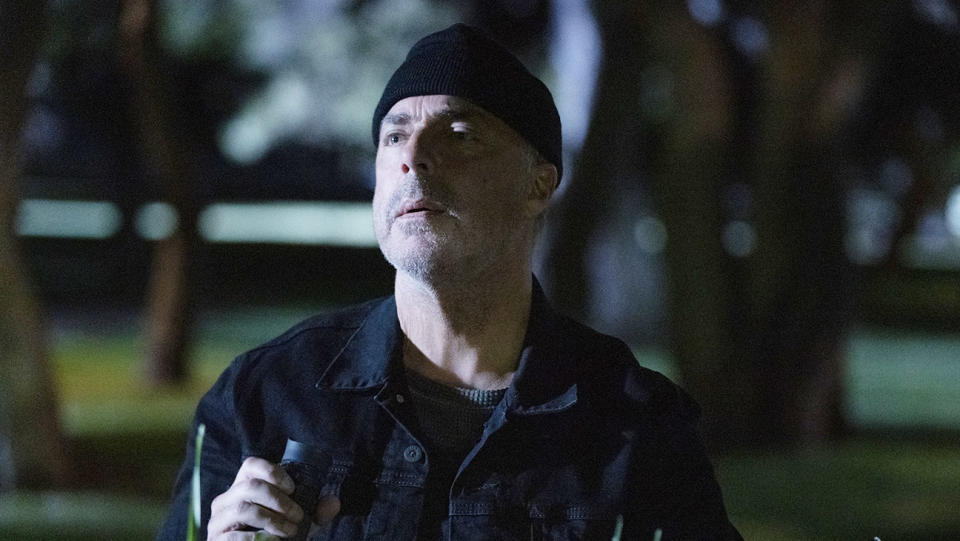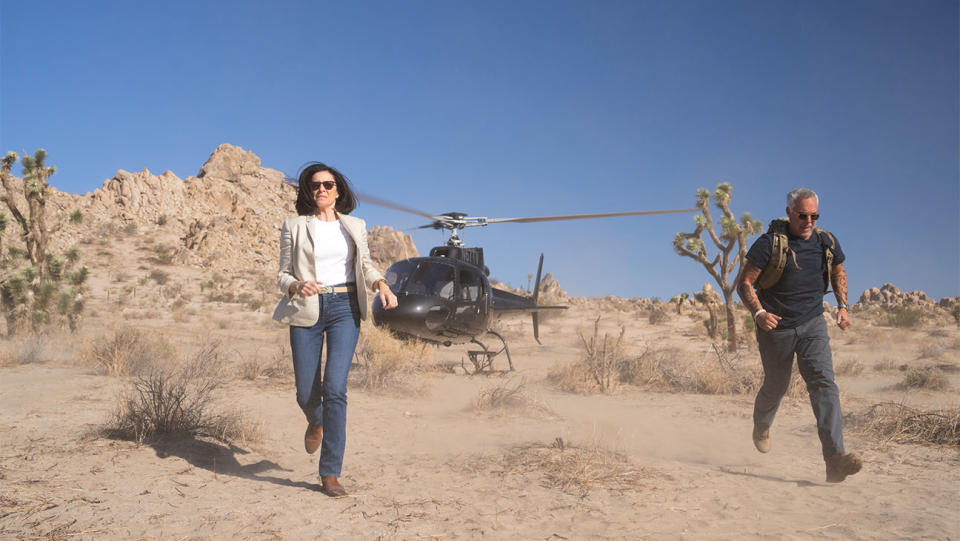‘Bosch: Legacy’ Boss and Author Michael Connelly on Season 2, Bosch’s Secret Ingredient and Record TV Run
- Oops!Something went wrong.Please try again later.
- Oops!Something went wrong.Please try again later.
- Oops!Something went wrong.Please try again later.
- Oops!Something went wrong.Please try again later.

[This story contains spoilers from the two-episode premiere of Bosch: Legacy.]
Working as a journalist covering the police beat in the ‘80s and ‘90s, Michael Connelly believed his reporter’s job would be a means to an end in becoming a best-selling author one day. He would parlay his riches of stories from the various personalities of law enforcement officers he met during his newspaper years and craft a fictional no-nonsense L.A. Police Detective named Harry Bosch. Bosch’s creed would be simple and to the point: “Everybody counts or nobody counts.”
More from The Hollywood Reporter
Leighton Meester, Robbie Amell Christmas Rom-Com 'EXmas' Lands at Amazon Freevee
Creators Once Dreaded the Pressure of Ratings, Now They're Fighting for the Data
Emmy Nominations 2023: Historic, Record-Breaking and Otherwise Notable Nominees
In 1992, The Black Echo became Connelly’s first best-seller featuring Detective Bosch. He hadn’t imagined then that, a little more than 20 years later, Bosch would become the longest-running single character in television streaming history, played by Titus Welliver. The character caught the imagination of Prime Video audiences for seven seasons with the series that bears the detective’s name. And now, Bosch: Legacy (on Amazon Freevee) takes viewers into the second chapter (and second season) where Harry Bosch (Welliver) has turned in his badge to become a private investigator while his daughter, Maddie (Madison Lintz) has followed in her father’s footsteps by joining L.A.’s Finest.
The Hollywood Reporter recently caught up with Connelly, 67, in Los Angeles via Zoom to discuss the success of the Bosch franchise (Legacy has already been renewed for a third season and the franchise is expanding with spinoffs) and where it’s headed as season two of Bosch: Legacy arrives on Friday. (The opening title card paid tribute to franchise alums Annie Wersching and Lance Reddick.)
Bosch: Legacy, the spinoff series, is beginning its second after the original had a seven-season run. When you first started writing your books on the character, and they became bestsellers, did you envision that this would one day become a franchise on screen?
Not really. I mean, you gotta be honest: Writers have egos and, at some point, either it’s very deep down, nothing I would yell out loud, but I felt like I had something to say in writing and people should read it. That is a very egotistical thing, so I can’t say that when I was writing these books, I never said to myself, ‘This would make a good TV show.’ But I was also aware of the long shot of that ever happening. And you know, I was not an overnight sensation. It would take me several years of writing books to really make any type of splash.
So the real answer is no, but I was hopeful. And that it happened 20 years down the line, I think made it a more fulfilling and yet surreal and totally joyful experience, that’s for sure.
What is the difference between Bosch and Bosch Legacy? We know that Bosh quit the police force in the original series and is now a private investigator, and his daughter, Maddie, joined the police force, but will the new series be significantly different from the original one?
We say it has the same DNA but obviously, we went from a one-hander to a three-hander very conscientiously. We started with Freevee saying we wanted to do a spinoff, but we want to elevate Maddie Bosch and “Money” Chandler [Mimi Rogers] to equal footing with Bosch. So that changes the philosophy in the writing room immediately. And so, our task is to find disparate stories that eventually tangle them together where can we get scenes with all three of them together, even though one is a rookie cop, one is private eye and ones is a lawyer. How can we get them into a scene together in every episode?
Bosch, for seven seasons and most of his life, was armored in the power and the might of the state. He carried a badge, he carried a gun. And now he’s out an outsider looking in. And that’s a significant change in character and we’ve enjoyed making that transition.
Are you still using the books as the framework?
The backbone of every season is usually a book and this one [for season two of Bosch Legacy) is The Crossing. But we’re way off the books at this point and inventing new stuff. I don’t know what they’ve allowed you to see, but you know the first two episodes, where we pay off last season’s cliffhanger, that’s not from any book.
Before becoming a successful book writer, you were a journalist, correct?
Yeah, and I had some overlap, but I was a journalist in south Florida and Los Angeles for 14 years. During a lot of these these years I was writing fiction at night. I covered cops so I spent a lot of years on the night beat. I had a writing shift at home, and I wrote a couple of books that never went anywhere, but they were learning experiences. I had to write them to write the one that first got published. So, there’s a big overlap and it was my fourth book where I was able to at least quit my day job per se, my journalism job, with the idea that I was making enough money that I could go three years and if I didn’t really click, I could go back to journalism if they’d have me.

Let’s talk about Titus Welliver. Did you know from the beginning that he would be perfect for the role as Bosch?
I had a sense. I mean, I had zero experience.. no I didn’t have zero — I was the creator of a show back in like the 2000s, but I wasn’t in it and of it. It was like I had an idea. It became a short-lived show and debuted against a show called CSI, which promptly killed it after about seven episodes.
But I had very limited experience, so when we decided with Amazon to make this show, we brought in some veteran people. I think that’s one of the keys to the success of the show. And when we all gathered to talk about the most important decision: who is Harry Bosch? I had thrown Titus’ name out because I had seen him in something and I could tell he could project inner turmoil really well. And if you have seen the first two episodes of the first season, you see that in an amazing performance.
But I was intimidated, because it’s not my world. I’m a book writer and, you know, I raised my hand and said, “What about Titus Welliver?” I was expecting people to possibly shout me down. But the answer was, “We love him, but he’s not on our initial list because he’s making a movie in Hong Kong” — one of the Transformers movies where he’s playing the bad guy. So then we went on and talked to many, many actors, had some auditions and so forth. But we weren’t finding Harry Bosch. And it took so long that we heard that Titus was coming back to L.A.
So, really at the 11th hour, we were given six weeks to cast our lead and on the Friday of the sixth week we heard that he could come in on a Saturday to audition, and he did. And on Monday, we told Amazon we found our Bosch!
The Bosch character continues to have longevity. Why do you think his character and these shows have resonated so well with the Prime audience?
As far as I know, he’s the longest running show in streaming [history], or longest running character I should say, because it’s broken up by two shows. But it is obviously the same DNA.
A couple of things: One is authenticity. We just go out of our way to try to create this world as accurately as we can, and we have a lot of help with that from real detectives and prosecutors. And I think we trust our audience. We think our audience is pretty smart, and that they crave authenticity and stick with it when they see it. And I think that’s a big part of it.
Also, there seems to be some kind of fascination with Los Angeles. And as kind of like the last resort or the idea that if something good or bad in terms of culture and social life happens, it might start there or it might be championed there. And so, I’m really talking more about my books, I’ve benefited from writing about Los Angeles in terms of publishing books all around this world, and I think that carries over into the show.
And we’re a rare show. Tt takes eight days to film an episode. We’re usually only on stage two days, then we’re out in the city that we’re trying to present and bring to life. And a lot of people shorthand it as a love letter to Los Angeles. I’m not sure that it is, but we are definitely seeing Los Angeles in all of its glories and negative attributes. I think that’s of interest to viewers.
The final thing is that of our performances. Our casting has been magnificent. There’s been no issues, no clunkers or anything like that. Everybody we seem to bring in, starting with the big parts of Titus and Madison and Mimi Rogers [attorney Honey “Money” Chandler], all the way down to small roles; they’ve just been excellent. And I think people come back for character.

Are you a lover of jazz? Or, tell us how the Bosch character became such a hug jazz aficionado?
I grew up with it in my house. It was my dad’s music and then, you know, you’ve got to reject your father or you gotta reject your parents at some point in your life (laughs). So, I went down a road of guitar music and Blues. I went down a different path, but then when I was writing these books, I just thought: I’m using what I know as a reporter. I’m making Bosch, as I said before, representative of the power and might of the state. He’s an insider, but I wanted him to feel like an outsider. And so, I took all these measures I could to make him feel that way. You and I, and my dad, are kind of unique if jazz is our primary music. And also, my father so happened to have terminal cancer when I was writing the first Bosch book; so, it was my nod to him. I gave his music to Harry Bosch. But it fit the character.
How have law enforcement officers received the Bosch franchise?
I think it’s generally positive. I mean we cover a lot of the downside or the bad side of police work, but also at the center of this is a guy who operates by this code that everybody counts or nobody counts. It’s a basic doctrine of fairness that I think if every cop on this planet followed, we wouldn’t have the problems we have you know. And I think every cop knows that deep at heart.
I think the best anecdote is that real LAPD Police Chief Michael Moore has said to me, “You’ve changed the esprit de corps of our department.” And that has resulted in a lot of access to real places. We film in a lot of real LAPD facilities.
Interview edited for length and clarity.
Bosch: Legacy releases new episodes Fridays on Amazon Freevee.
Best of The Hollywood Reporter

